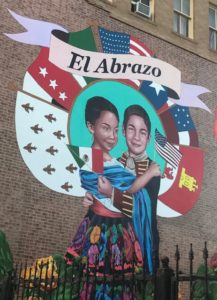Who are we?

We do not hate each other.
We are not warring tribes.
We are mostly decent people. Yes we are. And we mostly want the same things in life. Yes we do.
I know it doesn’t feel like that. I know that it seems there is vitriol and hostility everywhere, that evil prevails, that conflict is the norm. I have a few things to say about that.
There’s a journalistic axiom: When a dog bites a man, it’s not news. When a man bites a dog, that’s news. In other words: What makes the news is the unusual event, the oddity. The one car crash during rush hour, not the tens of thousands of commuters who make it home safely. The one distraught mother who harms her baby, not the millions who love and protect their children.
Before media streamed, drowning us in 24/7 content, before we carried the world in our pockets, back when tweets were what birds did, those who studied news content and journalism’s “man bites dog” proclivities discovered what they called the Mean World Syndrome. When asked about crime, when questioned about their personal safety and the health of their communities, people vastly overestimated trouble. They thought crime was far more prevalent than it was. They believed their chances of being a victim were far in excess of reality.
I think we are suffering right now from a version of Mean World Syndrome brought on by the masterful cooptation of the news cycle by the nastiest, meanest in our midst, aided and abetted by our bloated media diets, and sharpened by our ignorance of how real people really live.
I don’t claim to be an expert on how real people really live. But I know a lot more now than I did before my husband and I went on two camping trips that criss-crossed America (first coast to coast, then border to border) and brought us face-to-face with places and people in the massive “fly-over” zones that make up most of our country. We stuck to two-lane highways, spent time in towns you never heard of, ate breakfasts in diners, chatted up postmistresses and state park workers, waitresses and grocery clerks, people whose families had lived in the same towns for generations.
For these past 12 days, on this latest trip from the Canadian to the Mexican border down the country’s middle on Route 83, I experienced the country not via my news feed but through personal interactions. And I was heartened by what I saw and heard, by the Black, white and brown kids playing together in the school yard, by the blended Anglo-Mexican families picnicking, by friendly greetings on the street, by the everydayness of life lived in communities that are well loved by the people—the diverse people—who make these places their home. (Read this New York times piece about rural America.)






3 comments
The mural you show, on the side of an old hotel in Laredo, Texas, is based on an interesting annual festival that underscores your point: https://www.npr.org/2019/02/23/697297565/cities-laredo-and-nuevo-laredo-maintain-close-relationship-despite-border-separa
Thank you for your thoughts and observations, Lauren! Another country which is said to be divided and inhabited by two hostile tribes is Poland. But is it? I’m currently visiting my family (living in the province) and friends (looking for a good life in big urban areas) and according to their ballot papers they couldn’t be more different from each other. But are they? No, they aren’t. I woke up today thinking, our world – especially mainstream media – would need more Marshall Rosenbergs or other thinkers and practitioners concerned with non-violent communication, acknowledging human vulnerability and psychological needs. Thank you for your report which resonates so much also with my experience thousands kilometres away!
Thanks for this, Pawel. I was asked to speak at a meeting of Quakers last Sunday. They are pacifists, and many are involved in various nonviolent/ restorative justice movements. We were talking about crime and punishment, and how a community or a culture or a country needs to hold people who do harm accountable for the harm they do. But that to jump from “hold accountable” to “punish” (by death, imprisonment, etc.) is a very big jump. It’s like the jump between “we are different” and “I hate/ fear you.”
Leave a Comment